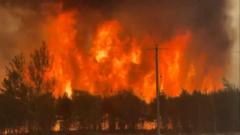As Canada battles its worst wildfire season on record, military aircraft are evacuating residents in Manitoba as fast-moving fires threaten communities, exacerbated by heat and dry conditions.
Military Aircraft Responds to Growing Wildfires in Canada

Military Aircraft Responds to Growing Wildfires in Canada
Military resources deployed as Manitoba residents evacuate amid escalating wildfires.
Military aircraft and helicopters have been deployed to assist in evacuating residents from the northern community of Pukatawagan in Manitoba, where rapid-moving wildfires have caused evacuations in the region. Thousands have already left the central prairie provinces, including Saskatchewan and Manitoba, as officials report over 180 active wildfires across Canada. Smoke from the fires has drifted down into parts of the United States, prompting health advisories in various states.
The Canadian government has declared a state of emergency in both Saskatchewan and Manitoba for the next month and has sought international assistance to combat the growing crisis. With current conditions described as extreme by the Canadian Interagency Forest Fire Centre (CIFFC), the situation in Manitoba remains critical, especially as the community of Flin Flon is left with only firefighters and support personnel.
In Pukatawagan alone, more than 2,000 residents still need evacuation, according to local officials. The Manitoba Wildfire Service, in conjunction with the Canadian Armed Forces, is actively utilizing military resources to ensure the safe transport of residents. With 25 fires burning in Manitoba, 10 of which are classified as out of control, the situation is dire.
Saskatchewan, facing its own challenges with 16 wildfires, reported seven that are still not contained. Meteorologists have indicated that while a cold front could affect parts of Saskatchewan, it will not provide relief to the fire-stricken areas. The forecast suggests winds, combined with the ongoing heat and lack of rainfall, could lead to further spread of the wildfires.
The smoke generated by the fires has raised air quality concerns in the United States as well, with advisories issued for an estimated 22 million Americans across states like Michigan and Wisconsin. In northern Minnesota, residents have been warned about poor air quality levels.
This year marks a record-breaking wildfire season in Canada, with over 42 million acres burnt thus far. While wildfires can occur naturally, experts indicate that climate change is escalating conditions conducive to such disasters. Raising awareness around how extreme heat impacts land and vegetation is essential as the nation grapples with this ongoing environmental threat.





















